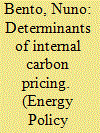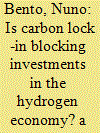| Srl | Item |
| 1 |
ID:
177496


|
|
|
|
|
| Summary/Abstract |
Action against climate change is urgent and requires the participation of firms. The progressive internalization of carbon costs by firms is essential in the transition to a low-carbon economy. Internal carbon pricing is an emerging set of practices voluntarily adopted by companies to embed climate footprint in operations and business models. We explore the factors that explain the adoption of internal carbon prices (ICP) among global companies reporting to the Carbon Disclosure Project between 2015 and 2017. We specifically test whether the macroeconomic, regulatory, industry, and firm-specific characteristics affect the disclosed level of the ICPs. Results show that the ICPs depend to a large extent on the national climate policy, country's development, industry, and corporate governance. Furthermore, context explain more the differences in ICP than industry and firm-specific characteristics. Thus uncertainties around countries' climate policy hampers carbon pricing in business. These findings shed light on the factors that contribute to the dissemination of carbon pricing in society.
|
|
|
|
|
|
|
|
|
|
|
|
|
|
|
|
| 2 |
ID:
099344


|
|
|
|
|
| Publication |
2010.
|
| Summary/Abstract |
The difficulty of introducing hydrogen and fuel cells in the market stems from the fact that they are not an evolutionary innovation such as biofuels or hybrid cars. Instead they create a disruption in technological utilization. The domination of oil technologies sets a socio-economical context favoring actors involved in the current paradigm, and gives less opportunity to alternative fuels to develop and challenge the status quo. If this hypothesis is correct, then companies interested in the hydrogen economy would not become active because of an unstable context or contradictory interests concerning the replacement of the present system. A review of actions and announcements of main actors shows that technology readiness and the absence of infrastructure are the major justifications to delay investments. Some measures are discussed, which could be deployed in order to reduce uncertainties, such as regulation of carbon emissions from cars, technological subvention, and partnerships for infrastructure implementation.
|
|
|
|
|
|
|
|
|
|
|
|
|
|
|
|